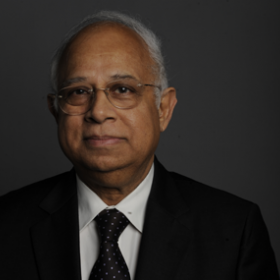
Pakistan's Predicaments
On April 16,EWI Board Member Ikram Sehgal, chairman of the Pakistani security firm Pathfinder Group, discussed Pakistan’s political climate at EWI’s New York Center. He addressed a number of domestic and regional challenges facing his home country, focusing on corruption, the upcoming national elections and the impact of the 2014 International Strategic Armed Forces (ISAF) withdrawal from neighboring Afghanistan.
Sehgal, who is also a political columnist for Pakistani newspapers such as The News International, decried the high level of privilege and corruption in Pakistan’s government. As an example, he noted that “70 percent of the legislators in the last parliament were neither registered taxpayers, nor were paying taxes themselves.”
He also warned that a lethal nexus of “corruption, organized crime and terrorism” is a chronic problem, producing contradictory trends. While the counter-insurgency strategy of Pakistani’s army has scored notable successes, he noted: “We have not really won the war against terrorism. Terrorism is alive and well in Pakistan.” A big part of the problem, he added, is that “the political will to fight terrorism is not really there in the current government.”
However, Sehgal does see some hope in the May elections. He noted that Pakistani women are increasingly involved in politics, as are growing numbers of newly registered young voters. The latter group has been attracted to politics by compelling figures such as Imran Khan, the former star cricket player-turned-politician. While not a member of Khan’s party, Sehgal insisted that he was “better than the corrupt people that we now have in power.”
Elections aside, the domestic fate of Pakistan is very much dependent on its neighbors—and, in particular, on Afghanistan. What happens following the withdrawal of foreign troops from that country next year will have an immediate impact on Pakistan, he cautions.
“The Afghan vacuum will spill over to Pakistan,” he declared. Although he does not see foresee a sudden dissolution of Afghanistan after foreign troops exit the country, he predicts that “it will happen gradually” unless the Afghan authorities perform better than they do now.
Nonetheless, Sehgal believes that Pakistan could have a bright future, in part, because of its considerable resources and skilled manpower. “We are one of the few developing nations that can feed and clothe our citizens,” he said. He then went on to rank his country as one of the world’s highest producers of copper, gold, coal, wheat, milk, cotton and other crucial resources. “I am an optimist about Pakistan,” he concluded.
Sehgal previously spoke at EWI’s 9th Worldwide Security Conference in Brussels, focusing on Economic Security in Southwest Asia. Watch the video of his address here.

